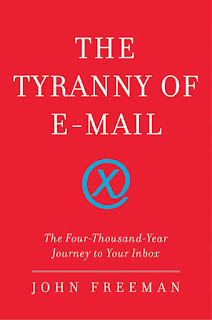Editing the World: an evening with Granta editor John Freeman
 |
| John Freeman and Maarten Asscher at Spui25, Amsterdam |
John Freeman, editor of literary magazine Granta, was invited to give a talk at Spui25, the literary-cultural centre of the University of Amsterdam, on 29 September. The event was moderated by Maarten Asscher, the director of the Athenaeum Boekhandel, an excellent pluridisciplinary, multilingual bookshop in the centre of Amsterdam.
Freeman is a journalist, book critic and writer from the US, and has written a.o. for the Guardian and the Wall Street Journal. Freeman became editor of Granta in 2008, after six years on the board of the National Book Critics Circle. He is also the author of The Tyranny of e-mail published in 2009, a book about the challenges of over information and a plea for slow communication.
Maarten Asscher announced in his introduction that the event was, next to a presentation of the magazine's history and its editor's vision, a celebration of issue 112: Pakistan.
"It's weird to be here as a guy born in Ohio, who grew up in California, speaking in the Netherlands about a British literary magazine on an issue about Pakistan!" says Freeman, adding how wonderful he finds that the windows of the Athenaeum Boekhandel are full of Granta magazines.
The first issue after its rebirth in 1979 (Granta was founded in 1889 by Cambridge students) was on New American Writing. Since then, explains Freeman, Granta has been a cultural space where writers can explore, "We want to publish a piece that doesn't fit elsewhere." When asked why Pakistan? He simply answers "why not?" Granta has already focused on places in past issues: London, Russia, Australia, Chicago... "We are looking for new writers all the time" says Freeman, "and there are many in Pakistan at the moment."
The cover of the Pakistan issue was painted by bus and truck artist Islam Gull from Karachi. His work was commissioned with the assistance of the local British Council office in Karachi (well done colleagues).
Freeman very much believes in the magical experience of reading a book, and this experience, he explains, is even stronger today that we are constantly connected to a machine: cell phone, e-reader, computer, TV... But he also mentions that having a print edition actually isn't commercially profitable, "we lose money." Freeman very much acknowledges the necessity of online communication tools to engage with their readers, but seems a strong advocate for print, "bringing an e-reader to bed is just like bringing any electronic appliance to the bedroom, it just doesn't feel right to me. But if people like it, I'm not going to argue against it of course."
Freeman has a clear vision of what he wants Granta to be: "We need to expand the idea of what a magazine is," he says, "Granta isn't about culture, it is about creating culture." He emphasizes on the important role of editors as advocates for writers and the existence of Granta "to capture the world and present writers who have something to write, a story that only they can write and that rips blood to get published."
When asked about writing his own book, Freeman confesses "I do miss the research and writing," telling anecdotes about his researches at the New York Public Library. Would he write for Granta? "No, I want to find the best writers in the world" he says passionately, "I don't even write introductions. I want the magazine to sound like a score, with no prelude."
Economically, Granta can exist thanks to publisher and philanthropist Sigrid Rausing who bought Granta Publications in 2005. When talking about sustainability, Freeman gives marketing strategies as examples, "if it will help us get readers, we do need to think about ads too." However, Asscher does point out that, when compared to Dutch literary magazines that circulate between 300 and 1100 copies, Granta's 55000 is an astronomical number.
What about the future? Will the digital beat the print version of Granta? "The most likely scenario is that it will be hybrid; some will read the print version and some will read the digital one." Today is a celebration of the print version with its beautiful cover and printed on a quality grained paper, but above all, it is the celebration of good writing. And it is inspiring to listen to such an enthused editor, who is more concerned about the quality of writing than of the format or tools on which we will read good writing now or in the future.
In the next issues, Granta will have a focus on several themes including: feminism today, the best Spanish speaking writing, aliens, ten years after (9/11),...











